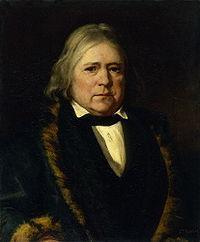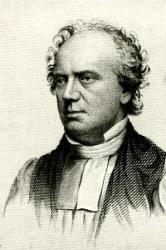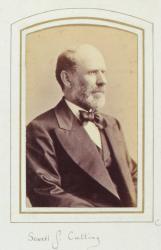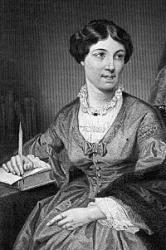Planning worship?
Check out our sister site, ZeteoSearch.org,
for 20+ additional resources related to your search.
- |
User Links
Person Results
‹ Return to hymnal





Export as CSV
William Johnson Fox

1786 - 1864 Person Name: W. J. Fox Hymnal Number: 135 Author of "Stabat Mater" in A Book of Hymns for Public and Private Devotion (15th ed.) Fox, William Johnson, the son of a small farmer in Suffolk, was born in 1786. As a boy he worked as a weaver, but subsequently spent six years in a bank. He was educated for the ministry under Dr. Pye Smith, at Homerton. His first settlement was with an Orthodox Independent congregation; but he very soon became a Unitarian. In 1817 he settled in London as minister of the Parliament Court Chapel. In 1824 lie removed to a new chapel at South Place, Finsbury, where he remained until 1852. He was a prominent member of the Anti Corn-law League; joined in founding the Westminster Review, and from 1831 to 1836 was owner of the Monthly Repository. From 1847 to 1863 he sat in Parliament as member for Oldham. He died in 1864. In 1841 he published Hymns and Anthems, London, Charles Fox. This, collection contained 150 selections from various authors, including Mrs. Sarah Adams, who was a member of his congregation. He included 13 of his own hymns. A new and enlarged edition of his Hymns, &c, was published in 1873. A memorial edition of his Works was published in 12 vols. in 1865.
His hymns which have come into common use outside of his collection include:—
1. A little child in bulrush ark. Moses.
2. Call them from the dead. The Spirits of the Past.
3. Gracious Power, the world pervading. Public Worship.
4. In the plan divine. Perfection of God's designs.
5. Jews were wrought to cruel madness. Good Friday. B. V. M. at the Cross.
6. The sage his cup of hemlock quaffed. Resignation.
[Rev. Valentine D. David, B.A.]
--John Julian, Dictionary of Hymnology (1907)
William Johnson Fox
Sir Walter Scott

1771 - 1832 Person Name: W. Scott Hymnal Number: 36 Author of "The Pillar and Cloud" in A Book of Hymns for Public and Private Devotion (15th ed.) Walter Scott was born in Edinburgh, August 15, 1771. In 1786, he commenced his apprenticeship as writer to the Signet. In 1796, he first appeared before the public in a translation of Burger's "William and Helen." Many poetical works followed, until in 1814, he began the series of "Waverly Novels." He died at Abbotsford, September 21, 1832. It is related that on his death-bed he distinctly repeated portions of the Latin original, upon which "That day of wrath, that dreadful day" is based.
--Annotations of the Hymnal, Charles Hutchins, M.A., 1872
======================
Scott, Sir Walter, Bart., was born in Edinburgh, Aug. 15, 1771, and died at Abbotsford, Sept. 21, 1832. Although so successful and widely known as a poet, he made no direct contributions to hymnody whatever. His condensed rendering of the “Dies Irae", and his hymn of Rebecca in Ivanhoe, "When Israel of the Lord beloved" (q.v.) were utilized as hymns for congregational use by others, but were never intended for such a purpose by himself. His work and rank as poet, novelist, and historian are fully set forth in his Life by J. G. Lockhart.
--John Julian, Dictionary of Hymnology (1907)
Sir Walter Scott
Sarah Elizabeth Miles
1807 - 1877 Person Name: Mrs. Miles Hymnal Number: 142 Author of "Looking unto Jesus" in A Book of Hymns for Public and Private Devotion (15th ed.) Miles, Elizabeth, nee Appleton, was born at Boston, U.S.A,, March 28, 1807, and married in 1833 to Solomon P. Miles, Head Master of the Boston High School, and afterwards the Principal of a private school for young ladies in the same city. He died in 1842. On leaving Boston, Mrs. Miles went to reside with her son at Brattleborough, Vermont. Her principal hymns are:—
1. The earth all light and loveliness. Part i. Summer.
2. When on devotion's seraph wing. Part ii., st. v., vii. Foretaste of Heaven. These two parts appeared as one hymn in The Christian Examiner, 1828.
3. Thou Who didst stoop below. Looking unto Jesus. Appeared in The Christian Examiner, 1827. Sometimes it begins with st. ii., "It was no path of flowers," as in the Boston Unitarian Book of Hymns, 1846.
4. Father, direct my ways. Divine Guidance desired in Affliction. In the Boston Book of Hymns, 1846; the Boston Hymns of the Spirit, 1864; and some other collections, it begins with st. ii., "Thou, infinite in love."
Three additional hymns were published for the first time in Putnam's Singers and Songs of the Liberal Faith, 1875. [Rev. F. M. Bird, M.A.]
--John Julian, Dictionary of Hymnology (1907)
Sarah Elizabeth Miles
William Crosswell

1804 - 1851 Person Name: Croswell Hymnal Number: 451 Author of "Hymn for Christmas" in A Book of Hymns for Public and Private Devotion (15th ed.) Crosswell, William, D.D., was born at Hudson, N.Y., Nov. 7, 1804; graduated at Yale College, 1822; entered for a time upon law studies, but eventually he entered Hartford College as a Theological Student, and then took Holy Orders in the Protestant Episcopal Church in 1829. In 1829 he became Rector of Christ Church, Boston; in 1840, of St. Peter's, Auburn, New York; and in 1844, of the Church of the Advent, Boston. Died suddenly at Boston, Nov. 9, 1851. Whilst at Hartford he assisted, during 1827-28, in editing The Watchman, and contributed to it many of his poetical pieces. His Memoir was written by his father, the Rev. Dr. Crosswell, of New Haven; and his Poems, collected by his father, were edited, with a short Memoir, by Dr. (now Bishop) Coxe, and published at Boston in 1800. Of his hymns the folowing are in common use:—
1. Lord, go with us, and we go. Journeying. This in Hymns for the Church and Home, 1860, No. 212, is a portion of his "Traveller's Hymn," first published in 1833. Concerning it Dr. Coxe says, "When on a journey with him, I reminded him of his 'Traveller's Hymn,' which I had seen but could not remember; and he told me, if I recollect aright, that it was a sort of Impromptu, which bubbled up when he was going with Dr. Wainwright from Boston to New York to attend the General Convention" (Memoir, p. xlii.); and in his notes, p. 282, he indirectly fixes the date of composition as 1832. Orig. text in 2 stanzas of 8 lines, in Poems, p. 255.
2. Lord, lead the way the Saviour went. For Sisters of Mercy. Written in 1831 for the Howard Benevolent Society of Boston. Dr. Coxe has entitled it "Hymn forSisters of Mercy," and says he "ventured to give it a name suited to the present state of the Church, in which Deaconesses and Sisters of Mercy are among other realizations of the poet's ardent hopes. Perhaps we owe them to his faithful prayers." (Notes to the Poems, p. 283.) It is generally accepted as the best American hymn for benevolent occasions. Original text, Poems, p. 256.
3. Now gird your patient loins again. Advent. This hymn for Advent is in 3 stanzas of 4 lines. Poems, p. 209; Hymns for Church and Home, No. 55.
4. 0 Saviour, leave us not alone. Lent. This is from his hymn for Lent beginning, "Thou who, for forty days and nights," in 4 stanzas of 4 double lines. In its abbreviated form it is found in Hymns for Church and Home, No. 85. Original in Poems, p. 219, in 4 stanzas of 4 double lines.
5. We come not with a costly store. Epiphany. For the Epiphany, from his Poems, p. 215, and based upon the Gospel of the day, in 2 stanzas of 8 lines.
6. And now the solemn rite is past. Ordination. This is composed of stanzas vii., viii. of his poem, "The Ordinal," in Poems, pp. 69-71, slightly altered. "The Ordinal" was written in 1828, and describes minutely his own ordination at his father's church, at New Haven, and the feel¬ings inspired, by the solemnity. It was printed in The Watchman, 1828. (Poems, Preface, p. xxvii.) The portion given as "And now the solemn rite is past" was included in Hall's Mitre, 1836.
Dr. Crosswell also translated the "Veni, Creator Spiritus" as "Creator, Spirit, come and bless us." His hymns are mostly unknown to the English collections. [Rev. F. M. Bird, M.A.]
--John Julian, Dictionary of Hymnology (1907)
=================
Crosswell, W., p. 269, ii. On the title-page of his Poems, 1861, this author is given as W. Croswell, and the best authorities are in favour of this spelling of the name.
--John Julian, Dictionary of Hymnology, New Supplement (1907)
William Crosswell
Jane Cotterill
1790 - 1825 Person Name: Mrs. Cotterill Hymnal Number: 38 Author of "Living to the Glory of God" in A Book of Hymns for Public and Private Devotion (15th ed.) Cotterill, Jane, née Boak, daughter of Rev. John Boak, and mother of the Right Rev. Henry Cotterill, Bishop of Edinburgh; born in 1790, married 1811 to the Rev. Joseph Cotterill; died 1825. Mrs. Cotterill contributed to the Appendix to the 6th ed. of Cotterill’s Selection, 1815, the following hymns:—
1. "O! from the world's vile slavery," (For Holiness). 2. "O Thou! Who hast at Thy command," (For Resignation). These hymns were repeated in Montgomery's Christian Psalmist, 1825, and Mrs. Cotterill's name was appended thereto for the first time. Their use is not extensive. The first, "O! from the world's," &c, is found in Kennedy, 1863, No. 521, as, "From this enslaving world's control," the alterations being by Dr. Kennedy.
--John Julian, Dictionary of Hymnology (1907)
Jane Cotterill
Robert Nicoll
1814 - 1837 Person Name: Nicoll Hymnal Number: 415 Author of "God Save the Poor!" in A Book of Hymns for Public and Private Devotion (15th ed.) Nicoll, Robert, was born Jan. 7, 1814, at Auchtergaven, Perthshire. At the age of 13 he began to write verse. In 1835 he opened a circulating library in Dundee, and in the following year he became the editor of the Leeds Times. This he retained for a short time only. Broken in health through taxing his strength too much, he died in 1837, He was a successful writer, and is often referred to as "a second Burns." His Poems and Lyrics were published in 1835; 2nd ed., with numerous additions and Memoir, 1842; 3rd ed. 1852.
From these Poems the following pieces are taken:—
1. An offering to the shrine of power. The Reformers.
2. I may not scorn the meanest thing. Humility. This and No. 1 date 1835.
3. Lord, from Thy blessed throne, (People's Anthem.) (1842.)
--John Julian, Dictionary of Hymnology, Appendix, Part II (1907)
Robert Nicoll
Sewall S. Cutting

1813 - 1882 Person Name: S. S. Cutting Hymnal Number: 509 Author of "Family Hymn. Evening" in A Book of Hymns for Public and Private Devotion (15th ed.) Cutting, Sewell Sylvester, D.D., a Baptist Minister, was born at Windsor, Vermont, Jan. 19, 1813, graduated at the University of Vermont, 1835, and was ordained at Boylston, Massachusetts, 1836. He was pastor at Southbridge, Mass., from 1837 to 1845. Editor of the New York Recorder. 1845-50, and 1853-55; and of the Christian Review, 1850-53, and 1855-68. In 1868 he was appointed Professor of Rhetoric and History at the University, Rochester, N. York, and Secretary of the American Baptist Educational Commission. He died at Brooklyn, Feb. 7, 1882. His Historical Vindication of the Baptists was published in 1858.
His hymns in common use include:—
1. Father, we bless the gentle care. The love of God. Appeared in Hymns for the Vestry and Fireside, Boston, 1841.
2. Gracious Saviour, we adore Thee. Holy Baptism. Appeared in Winchell's Additional Hymns, 1832, No. 509 (the author being then but 19); again in the Psalmist, 1843, and others.
3. Great God, Thy glories blaze. Praise to God the Father. Appeared in Linsley and Davis's Select Hymns, 1836-41, No. 514. In the Psalmist, 1843, it was altered to "God of the world, Thy glories shine." This is repeated in several collections, including the Baptist Praise Book, 1871, in 4 stanzas of 4 lines. In the Baptist Service of Song, 1871, it is given as "God of the world, near and afar," is expanded into 5 stanzas, and is dated 1835.
4. 0 Saviour, I am blind, Lead Thou my way. The True Guide. This hymn, in I. D. Sankey's Sacred Songs and Solos, is also by Dr. Cutting. [Rev. F. M. Bird, M.A.]
--John Julian, Dictionary of Hymnology (1907)
Sewall S. Cutting
Andrews Norton
1786 - 1853 Person Name: Norton Hymnal Number: 322 Author of "Fellowship of His Sufferings" in A Book of Hymns for Public and Private Devotion (15th ed.) Norton, Andrews, D.D., son of Samuel Norton, was born at Higham, Massachusetts, Dec. 31, 1786, and was educated at Higham, and at Harvard College. After being engaged there for a short time as a tutor, he was appointed Librarian, and subsequently Lecturer on Biblical Criticism, as successor to Dr. Channing. When the Theological School was opened in 1819 he became Dexter Professor of Literature. This position he held until 1830. He died at Newport, Rhode Island, Sept. 18, 1853. He was for some time editor of the General Repository and Review, and published several prose works, one of the most extensive being The Genuineness of the Gospels, in 4 volumes. His hymns are few in number, and are mainly meditations in verse. They were contributed to various periodicals, and after his death were collected and published in a small volume. Of these hymns the following are in common use:--
1. Another year, another year, The unceasing rush, &c. Close of the Year. Appeared in the Christian Examiner in Nov. and Dec. 1827, in 11 stanzas of 4 lines. It is used in an abbreviated form. In the American Boston Unitarian Hymns [&Tune] Book, 1868, it begins with st. vi., "O what concerns it him whose way."
2. Faint not, poor traveller, though thy way. Fortitude. Printed in the Christian Disciple, July and Aug., 1822, in 7 st. of 4 1., and again in the West Boston Collection, 1823.
3. He has gone to his God, he has gone to his home. Burial. Printed in the Christian Examiner, Jan. and Feb., 1824.
4. My God, I thank Thee! may no thought. Trust and Submission. Appeared in the Monthly Anthology and Boston Review, Sept., 1809. This is his earliest and best known hymn.
5. 0 stay thy tears:for they are blest. Burial of the Young. Printed in the General Repository and Review, April, 1812, in 5 st. of 4 1. In 1855, st. iii.-v. were given in Beecher's Plymouth Collection, No. 1094, as "How blest are they whose transient years."
6. Where ancient forests round us spread. Dedication of a Church. This "Hymn for the Dedication of a Church," is dated 1833.
These hymns are in some of the American hymnals. Nos. 1, 4, 5 are in Martineau's Hymns, 1873, and the full texts of all are in Putnam's Singers and Songs of the Liberal Faith, Boston, U.S.A., 1875. [Rev. F. M. Bird, M.A.]
--John Julian, Dictionary of Hymnology (1907)
Andrews Norton
Harriet Martineau

1802 - 1876 Person Name: H. Martineau Hymnal Number: 173 Author of "The Coming of Christ in Power" in A Book of Hymns for Public and Private Devotion (15th ed.) Martineau, Harriet, was born at Norwich, June 12, 1802, and died at Ambleside, June 27, 1876. Best known as the writer of Illustrations of Political Economy, Retrospect of Western Travel; two novels, Deerbrook and The Hour and the Man; Eastern Life, Past and Present; a History of the Thirty Years’ Peace, and various other works. Her first publication was a book of Devotional Exercises, with hymns appended to each Exercise, and her hymns also belong to what she speaks of in the Autobiography as her "Unitarian" period. Five of them appeared in A Collection of Hymns for Christian Worship, printed in 1831 for the congregation of Eustace Street, Dublin, and edited by her brother, the Rev. James Martineau.
1. All men are equal in their birth. Human Equality.
2. Lord Jesus! come; for here. Jesus desired. Sometimes given as(1) "Come, Jesus, come, for here"; (2) and "Thy kingdom come, for here."
3. The floods of grief have spread around. In Affliction.
4. What hope was thine, O Christ! when grace. Peace.
5. When Samuel heard, in still midnight . Samuel.
The Rev. J. R. Beard's Collection 1837, contains 1, 2, 4 and 5, and:—
6. The sun had set, the infant slept. Gethsemane. The Rev. W. J. Fox's Hymns and Anthems, 1841, contains No. 1, and
7. Beneath this starry arch. Progress . [Rev. Valentine D. Davis, B.A.]
-- John Julian, Dictionary of Hymnology (1907)
Harriet Martineau


 My Starred Hymns
My Starred Hymns


